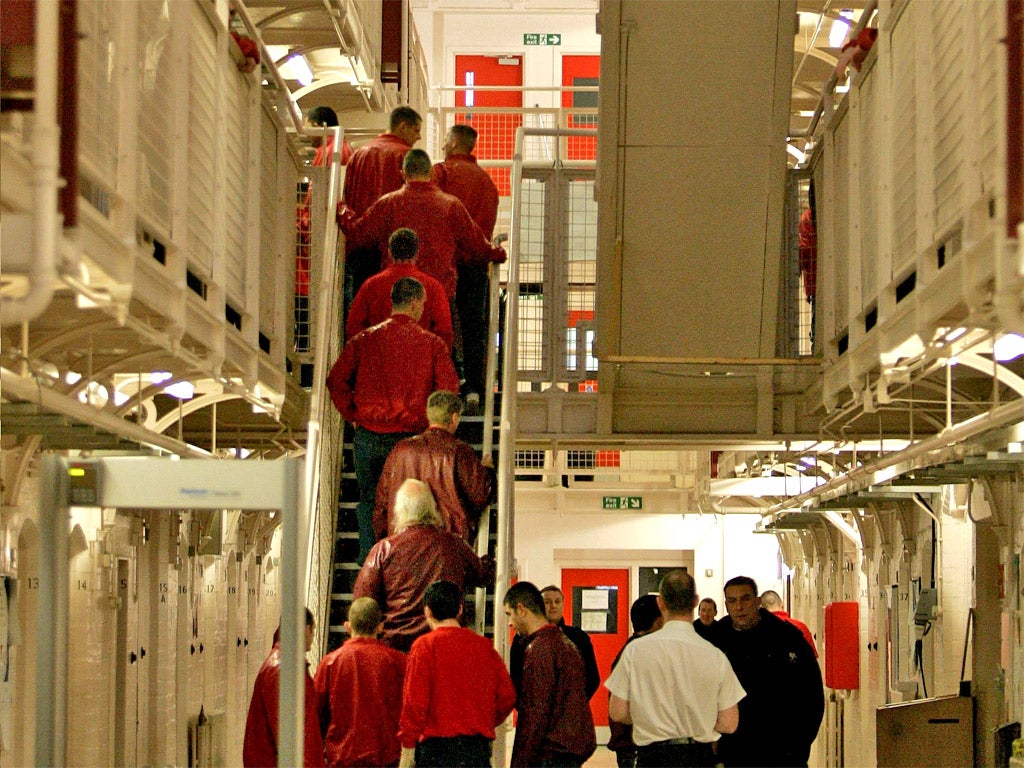Use of riot squads in jails has soared amid overcrowding crisis

The number of times that officers trained to quell riots have been called in to calm tensions in prisons has soared over the last year, Ministry of Justice figures disclosed today.
The rapidly growing use of the prison service’s National Tactical Response Group (NRTG) prompted warnings of an imminent crisis behind bars in England and Wales.
Penal reformers blamed the surge on a “toxic mix” of a growing prison population, inmates being locked up for longer periods and cuts to staff levels.
Numbers of call-outs have grown by more than 50 per cent between 2012 and 2103.
The MoJ said the squad was drafted in 151 times in the first nine months of the year, compared with 129 during the whole of 2012.
They were called in earlier this month when prisoners went on the rampage at Maidstone prison in Kent, as well as at Full Sutton in North Yorkshire in May when an officer was taken hostage.
The squad has also been deployed in a succession of other lower-level incidents with the task of stopping simmering disputes escalating into violence. Nearly half of all prisons have had call-outs in the last three years.
The former Chief Inspector of Prisons, Lord Ramsbotham, raised fears the situation could be as serious as in 1990 when a riot at Strangeways in Manchester triggered trouble in jails across the country.
“It there is a major riot, it will be copycatted. This is an alarm call,” he told the Independent.
“There is definite overcrowding. Matched with that, there is no increase in activities prisoners can undertake. Therefore far too many are left with absolutely nothing to do.”
Sadiq Khan, the shadow Justice Secretary, who obtained the statistics, said the figures spotlighted the “true scale of the growing crisis in our prisons”.
He said: “All this government’s talk of a ‘rehabilitation revolution’ is but a distant memory. Instead prisons are more overcrowded and dangerous than in May 2010, with prisoners spending as much time festering in their cells as they did three years ago.
“This means not working or attending training courses which in turn means less chance of being rehabilitated or paying something back to society.”
Juliet Lyon, the director of the Prison Reform Trust, said: “Drastic cuts to prison staff and budgets, a far-reaching reorganisation of the secure estate and a steep rise in prison numbers driven by tough political talk could prove to be a toxic mix.”
Frances Crook, the chief executive of the Howard League for Penal Reform, said: “We are concerned there is creeping pressure on the prison system and this will create more disturbances and disorder.
“At a time when the number in custody is rising, the Ministry of Justice is facing a dilemma – either use police cells or cram ever more people into combustible prisons. Either approach is a waste of money and risks lives.”
The Justice Minister, Jeremy Wright, said there had been a recent “slight rise” in callouts.
But he added. “This is mainly due to minor incidents such as prisoners protesting by climbing onto the netting between landings.
“NTRG staff have the specialist skills required to deal with such incidents which accounted for 68 per cent of all the callouts in the past year and they are frequently called to attend as a precautionary measure.
“Not all callouts result in engagement by NTRG staff, with a number of situations being resolved locally. Of the 151 incidents NTRG attended up to September 2013, 75 per cent were resolved by surrender.”
Bookmark popover
Removed from bookmarks